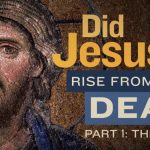Are There Prayers We Shouldn’t Pray?
Today I want to look at a topic that probably doesn’t get as much airplay as it should. I want to look at why some prayers don’t seem to work and what you and I do when that happens. I want to rattle your cage and then give you hope.
It’s important that you do everything you can to stay engaged right throughout today’s message because I’m taking a bit of a risk this morning. I’m leading us out onto shaky ground and I want everyone to be with us when we arrive back on solid rock.
One of the things that’s common to all of us is our inbuilt need to see order in our lives. We look for patterns behind events that then give our lives structure and meaning. We try to fit things into our particular view of the world and how it operates. There’s an expectation if we do certain things there’ll be predictable results. This carries over into our relationship with God and for the most part works for us if we don’t think too deeply about the inconsistencies that crop up from time to time. You see it’s those little glitches in the model of our personal world that can cause all sorts of trouble for us if left unattended. There’s sometimes a disconnect between what we believe on a personal level and what we see happening all around us and it’s when we start to question those inconsistencies that we can end up experiencing a crisis of faith. Surely if God works this way here then he should work the same way there and when we perceive that He isn’t, we can then begin to doubt His actions everywhere.
I’m not saying questions are troublesome to Christians. If you’ve been a member of Grace for any amount of time you’ll realise that we love great questions. But what I am saying is you need to persevere through to an answer, especially for those questions that on the surface, appear to be problematic to your faith in a good God.
Here are some questions that you may have thought yourself. You very rarely hear them verbalised by Christians but at times you may hear them from opponents of Christianity.
- If God wants what is good for people, why would he not wish (or be able) to do something that is good for others unless we asked him to?
- Even given their ability to reject God’s good intentions for them, why does God wait for others to intercede before trying to help them?
- When we come to God in prayer, we inevitably wonder why we should make requests, if God already knows what we need and wants to give us what is good for us.
- Do we pray simply to acknowledge our dependence upon God or to prepare ourselves to receive with a proper attitude what he is going to give us anyway, or does God actually do some things in response to prayer that he would not otherwise do?
- Can we pray for the weather to change or a crying baby to fall asleep?
- Is prayer more effective depending on the number of people who make a particular request and, if so, why?
- If I thank God for a car park that I found when running late to an appointment in the city, does that mean the next time I can’t find a carpark God was out having a lunch break?
‘Paddy was driving down the street in a sweat because he had an important meeting to get to and couldn’t find a parking spot. Looking up to heaven, he said “Lord take pity on me. If you find me a parking spot, I’ll go to Grace every Sunday for the rest of me life and give up me Irish whisky!”
Miraculously, a parking spot appeared. Paddy looked up again and said: “Never mind Lord, I found one”.
We all have within us an expectation of how God should respond to us and to others in the world.
Theologians call God’s actions in the world God’s Providence
Merriam Webster Dictionary – Definition of providence – divine guidance or care
Providence is the guardianship and care provided by a deity or god. Religious people thank their god for his providence.
The word provide is a good clue to this word’s meaning: when a religious being is said to give people providence, he’s taking care of them — providing for them. For religious people, any good thing that happens to them — like landing a new job, getting healthy, or finding money on the ground — could be considered an example of providence.
General Providence: is the way that God normally works within and usually through his creation. It is often described as the natural order because of its visible regularity that makes scientific study possible. He makes the rain to fall on the righteous AND the wicked.
Special Providence: is God’s action in creation that departs from his usual way of sustaining the natural order. It is usually redemptive, and it may be spoken of as divine intervention because of its relative infrequency by comparison with the way God usually works (i.e., his general providence) Miracles are a particular form of special providence.
In our desire to make sense of the world we seek to attach meaning to events and look for reasons that explain why things happen the way they do. Theologians down through the ages have endeavoured to come up with models that explain God and his interactions with humankind in a logically and morally cohesive way that stays true to scripture but also fits with actual experience.
Theologians have come up with various models of providence to try and make sense of God’s activity on the earth and in a believers life that keeps His activity true to His revealed nature and their interpretation of his expressed will for humankind.
It shouldn’t surprise us that there are different models set out on a scale starting with a very much “hands off” approach by God to a model that says that everything no matter how small, is controlled by God and happens according to His predetermined will. We are after all, dealing with theologians here and they do like to think and make sense of the world in a scripturally sound way. Which can get a little difficult at times to work through. I always laugh when I remember how the Apostle Peter described the Apostle Paul. “He’s a good bloke but at times he writes things that are a little bit difficult to understand.”
Before we go any further I want to remind you of a little proverb that says, “The person who gets to present their case first always appears right, that is, until the second person speaks.” It’s a good little reminder for all of us. Don’t jump on the first band wagon that drives past until you’ve looked at all the others following it. Have you ever seen anything on social media that you thought made absolute sense and then someone else commented with a different viewpoint and you wondered how you’d been so completely fooled by the first person’s perspective?
On the far left hand side of the scale we have the Semi-Deist Model
In the semi-deist model of providence, God has created a world that is governed by laws of physical and moral order. He has created intelligent, libertarianly free and morally responsible creatures, and he sustains their existence. They are expected to act wisely, in accordance with the rules of the established order. God will not intervene to protect people from either their own improper behaviour or from that of others. If he were to do so on behalf of some people, he would be responsible for allowing others to experience evil without his intervention. And that’s a charge against which semi-deists wish to protect God from. This model doesn’t consider God inactive; it simply asserts that the entire history of the universe as it unfolds is one big act on God’s part. Within that act of God, his creatures, you and I, operate, and we bear complete responsibility for our actions.
Semi deists recognise that petitionary prayer to God is a common and perhaps natural practice of human beings. Indeed, Jesus himself taught us to address petitions to God. They urge us, however, to interpret the language of petition differently than is commonly done. When we make requests to God, we’re not asking Him to intervene in our particular situation and change either events or people. We’re acknowledging God’s existence, and we’re expressing our intention to be actively engaged in deeds that will further the general harmony of the world and its people, thereby doing the “will” of God. Praying individually and corporately are ways of strengthening our own resolution to be constructively engaged in solving the problems of the world that have arisen from behaviour contrary to the divinely established order.
If God is praised for the good things that happen, he must be blamed for the bad ones.
An American airliner was hijacked to Beirut by Shiite Muslims, and all but one of the people taken hostage came away from the incident safely. After their liberation the pilot spoke for the hostages and expressed thankfulness for the way the Lord had taken good care of them. Maurice Wiles, a semi-deist, finds this kind of response “a source of profound embarrassment to many a reflective Christian,” and he asks, “Where was God’s care for the hostages when one of them was murdered and his corpse thrown out on to the tarmac.”
Wiles feels compelled to believe that God’s providential involvement in the ongoing history of the world is severely limited. His concern has been neatly summed up in the following conundrum:
“If God can influence the course of events, then a God who is willing to cure colds and provide parking spots but is not willing to prevent Auschwitz and Hiroshima is morally repugnant. Since Hiroshima and Auschwitz did occur, one must infer that God cannot (or has a policy never to) influence the course of worldly events.”
In a recent article Wiles contends that miracles “should have no place in Christian theology.”
For the deistic model of providence to hold together there can be no hint of God directly intervening in his creation. “One action of so distinctively different a kind would be sufficient to call into question the claim that the absence of divine intervention in relation to so many evils and disasters in the world is because such direct action is logically incompatible with the kind of world that God has chosen to create.”
Down the other end of the scale we have the fatalist model.
This model views God as absolutely in control. Its’ distinctive is that God not only determines the outcome of all events, he is, to all intents and purposes, the only actor in them. Everyone else is simply acting by God’s will and their sense of having significant freedom of their own is illusory.
God is the only cause in the world, everything else is effect. Petitionary prayer is ruled out by this uni-causal model. Prayer is an act of worship in which one acknowledges God’s greatness and expresses one’s own willing submissiveness to the all-powerful will of the all-wise God. Que Sera Sera, what will be will be.
In this type of model asking God for anything is a waste of time because everything that will happen, happens at His instigation and we have no power to influence him to change his mind or act outside of His predetermined will.
One of the problems that this model faces is the question of evil. If God is responsible for everything that happens in the world then He’s also the cause of all evil in the world. They do a lot of hoop jumping to reconcile their belief in God being in control of everything and their belief in the intrinsic goodness of God. This model also causes issues when dealing with pain and suffering.
Sometimes when listening to people talk about tragedy and suffering and God’s love for all humankind you’ll hear them say something along the lines of [Slide] “If God has the power to prevent evil from happening and He does nothing to prevent it he must be complicit in the act of evil. Which I think is a good argument against the fatalist model.
So we have on one hand God setting things up and then stepping back and letting things run their course all the way through to God being the primary cause of, and intimately involved in, everything that happens. And both models basically say that petitionary prayer is a waste of time.
We don’t have time to go through every model proposed by theologians because that would be a semester of study however I want to touch on one more model that seeks to bring these two extremes together and answer some of their failings, in particular the place of petitionary prayer in a Christian’s life.
And then there’s the Church Dominion Model
The church Dominion model believes that God is immensely powerful and is able to accomplish his will in the world but that he has chosen to restrict his special action to those things for which the church prays. He’s done this in order that prayer might be a training ground in dominion for the church.
Watchman Nee finds many passages in the Gospels that “affirm that God has subjected Himself to limitations.” He could not do a mighty work in Nazareth (Mk 6:5), and the people in Jerusalem would not come to him (Mt 23:37).’ “The water of divine deliverance depends upon the provision of human ditches.” ‘ God has determined not to accomplish his purpose without the cooperation of human wills. “Whereas in the eternities God was absolute, here in time He has chosen, instead of compelling His creatures, to limit His own omnipotence to their free choice. Man has been given power to make way for, or to obstruct, the power of God.” He subjected himself to this limitation because he knew that it would result in the triumph of divine love in the eternal future.”
According to Paul Billheimer, the universe was created “to provide a suitable habitation for the human race.” And the human race was created for just one purpose: “to provide an eternal companion for the Son.”” At creation, humans were “given rulership of the earth, kingship of its life, and the control and mastery of its forces” (Gen 1:26). This was a “bona fide grant”; it was God’s to do with as he wished, and he did not give the earth to humans “with certain strings attached.”‘ Tragically, the first humans then gave the dominion to Satan who became “the legal and actual ruler of this world,” the god of this world, the prince of this world and the prince of the power of the air.” The only way that God could legally recover this dominion for humans was through a human being, the original trustee of the earth. But because humans had now become enslaved to Satan, they were incapable of freeing themselves. “A man had to he found upon whom Satan had no claim or control in order to head a movement for swinging the world back to its original allegiance. This man had to be able to remove Satan’s legal claim to the earth before it could he restored to its original rulership.” He also had to be “a member of the trustee group” who was “absolutely perfect in order not to give Satan any legal claim upon him.” When Satan brought Jesus to the cross but failed to incite him to rebellion against the Father, Satan “became the murderer of an innocent victim upon whom he had no claim; he therefore became subject, in the court of universal justice, to the death penalty.””‘ This is believed to be the point of Hebrews 2:14. All of the legal claims that Satan secured upon earth and humanity through the fall of Adam have now been canceled. “Since the cross, he has absolutely no right at all upon any one or any thing. It means that all the power which he exercises now he exercises solely by deception and bluff” (cf. Mt 28:18).” The legal victory achieved at Calvary must be enforced, and the enforcement has been placed in the hands of the church, which is Christ’s body upon the earth (Mt 16:18, 19; Lk 10:17-19; implied in Mt 28:18-19). “The body with hands and feet is the vehicle which carries out the commands of the head. If the body fails to respond, the will of the head becomes a dead letter.
Billheimer argues that “the church, and only the church, is the key to and explanation of history”; this is the only aim of creation. “From before the foundation of the world until the dawn of eternal ages God has been working toward one grand event, one supreme end-the glorious wedding of His Son, the Marriage Supper of the Lamb” (Lk 12:32; Rev 3:21). The Messiah came for just one purpose, “to give birth to his church and thus to obtain his bride.” The church, which was later to become the bride of Christ, is “the central object and goal not only of history but of all that God has been doing in all realms from all eternity” (Rev 21:9) Christ has “deputised the church” to implement his ongoing work on the earth (Mt 16:18-19; 18:18; Lk 10:19; Jn 20:21-23). God is able to work in the world and could presumably do so on his own initiative, but his primary purpose is to develop the church, preparing it for its end as the bride. He has thus limited his own initiative in acting in the world, in order to maximise the training of church members and thereby to fulfil his primary intention for human history. Billheimer says nothing about the general providence of God, his caring for all creatures and his preservation of creation. Presumably these are things God does without having to he asked by the church. Where the church exercises administration would appear to be in the area often called special providence, the specific acts of God to protect, strengthen, heal, influence minds and so forth.
If we’re convinced that our prayer concern is truly from God, the answer to our prayer is never in doubt, all we need to do is persist in prayer. The point of persistence Billheimer says, isn’t that God needs to be persuaded to do something for which he has urged us to pray; the delay is part of God training us to overcome Satan. So God only allows Satan to resist us “as long as it serves his purpose for our growth, development and maturity.”
Watchman Nee says the will of God is the starting point, but we’re the ones who voice God’s will. “And if we do not voice it, it will not be done. Our prayers thus lay the track down which God’s power can come. Like some mighty locomotive, His power is irresistible, but it cannot reach us without rails.” If the church ceases to pray, “God ceases to work, for without their prayer He will do nothing. It is they who bring heaven’s power to the place of need.” The church cannot increase God’s power, but she can limit it. “She cannot make Him do what He does not will to do, but she can hinder that which He does will.
So there you have 3 models of divine providence.
The first makes a case for God’s inactivity in world events, the second makes a case for every event being an act of God and God being totally in charge of everything that occurs and the third makes a case for God limiting himself in order that His church would grow to maturity as they cooperate with Him in seeing His will come to pass.
Each model gives us a framework to attach our experience to. Each model seeks to present a cohesive pattern for God’s activity on the earth.
So where does that leave us?
Over the past few weeks as I’ve prepared this message I couldn’t get past the fact that you needed to be an intellectual to even begin to understand what a lot of the theologians were discussing or at least have the necessary vocabulary to understand the language that they were speaking. I didn’t think that the common folk of Jesus time would have heard them gladly as they did Jesus and yet one of the things that I love about Jesus, was his ability to share profound spiritual truth in a way that made sense to everyone.
I started my message talking about the difference between general providence and special providence and I think that Jesus demonstrated both quite clearly in his own life and gives us an insight into how we should approach them in our own lives with regards to prayer.
He knew what it was to be hungry and tired and he also on two occasions fed thousands of people with only a few loaves of bread and a couple of fish. He crossed over the sea of Galilee in boats time and time again and on one occasion walked over on his own two feet. He was spat upon and beaten with fists and had his beard pulled out but he also walked straight through a crowd that was determined to throw him off a cliff and no-one laid a hand on him. Jesus lived just like you and I and experienced God’s General Providence on a day to day basis. And then on various occasions experienced God’s Special Providence when God’s will for the redemption of humankind required it.
On my way home the other night I was thinking about Jesus’ words to his disciples as he gave them their marching orders before sending them out into the world. It’s interesting that he didn’t command them to go out into all the world and eradicate sickness and disease so why do we feel that someone not being healed when prayed for is an affront to our belief in God? I was also thinking what the world would be like if every christian had power over the weather and yet the disappointment people feel when they have prayed for a change in the weather that doesn’t then happen, seems to be at odds with our belief that weather manipulation isn’t actually a promise from God. There’s often a disconnect between what we believe to be true and what we expect to happen (for ourselves personally) when we pray and too often it’s our relationship with God that’s most damaged over our faulty logic.
Personally I believe there’s a correlation between God’s will and prayer that makes our prayer effective. As the Bible tells us, when we pray according to the will of the Father we will have that which we ask.
The question that begs to be asked then is how many times have we missed out on seeing God’s will outworked because we haven’t prayed?
Maybe we’re too preoccupied in seeing our will being done rather than God’s?
Maybe that faith crisis you’re having is a gift from God to make you question yourself and seek deeper answers. A prayer that goes unanswered doesn’t mean that God doesn’t exist. It could simply be pointing you to a moment of truth about yourself and the prayers you are praying. . .
Why else would Jesus teach us to pray
May your Kingdom come soon.
May your will be done on earth,
as it is in heaven.











